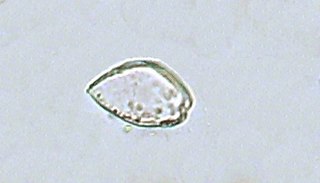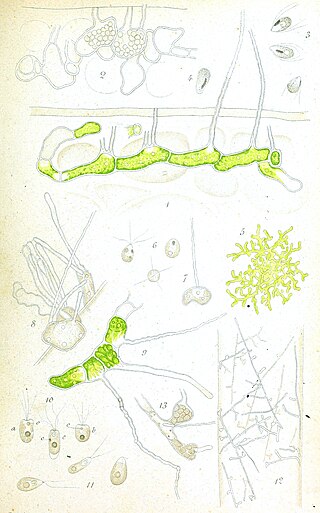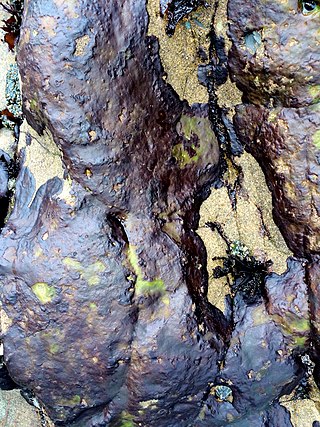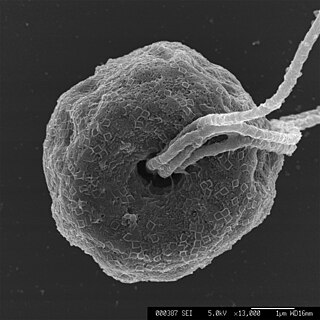
The Chlorophyceae are one of the classes of green algae, distinguished mainly on the basis of ultrastructural morphology. They are usually green due to the dominance of pigments chlorophyll a and chlorophyll b. The chloroplast may be discoid, plate-like, reticulate, cup-shaped, spiral- or ribbon-shaped in different species. Most of the members have one or more storage bodies called pyrenoids located in the chloroplast. Pyrenoids contain protein besides starch. Some green algae may store food in the form of oil droplets. They usually have a cell wall made up of an inner layer of cellulose and outer layer of pectose.

Chlamydomonadales, also known as Volvocales, are an order of flagellated or pseudociliated green algae, specifically of the Chlorophyceae. Chlamydomonadales can form planar or spherical colonies. These vary from Gonium up to Volvox. Each cell has two flagella, and is similar in appearance to Chlamydomonas, with the flagella throughout the colony moving in coordination.

The Prorocentrales are a small order of dinoflagellates. They are distinguished by having their two flagella inserted apically, rather than ventrally as in other groups. One flagellum extends forward and the other circles its base, and there are no flagellar grooves. This arrangement is called desmokont, in contrast to the dinokont arrangement found in other groups. Accordingly, the Prorocentrales may be called desmoflagellates, and in some classifications were treated as a separate class Desmophyceae.

The glaucophytes, also known as glaucocystophytes or glaucocystids, are a small group of unicellular algae found in freshwater and moist terrestrial environments, less common today than they were during the Proterozoic. The stated number of species in the group varies from about 14 to 26. Together with the red algae (Rhodophyta) and the green algae plus land plants, they form the Archaeplastida.

The Fucales (fucoids) are an order in the brown algae. The list of families in the Fucales, as well as additional taxonomic information on algae, is publicly accessible at Algaebase.

AlgaeBase is a global species database of information on all groups of algae, both marine and freshwater, as well as sea-grass.
Pedinophyceae is a class of green algae in the division Chlorophyta.

The Trebouxiophyceae are a class of green algae, in the division Chlorophyta. Their circumscription within the green algae is not well established due to the need for more genetic studies at higher levels within the group.

Phaeophila is a genus of green algae in the family Phaeophilaceae.

Chlorokybus is a multicellular (sarcinoid) genus of basal green algae or charophyte. It has been classified as the sole member of the family Chlorokybaceae, which is the sole member of the order Chlorokybales, in turn the sole member of the class Chlorokybophyceae. It grows on soil and rock surfaces, and is rare.
Mesostigma is a genus of unicellular biflagellate freshwater green algae, with a single species Mesostigma viride, covered by an outer layer of basket‐like scales instead of a cell wall. As of February 2022, AlgaeBase classified it as the only genus in the family Mesostigmataceae, the only family in the order Mesostigmatales, the only order in the class Mesostigmatophyceae. It is now considered to be one of the earliest diverging members of green plants/algae (Viridiplantae).

Ralfsiales is an order of crustose brown algae containing two families.

Pyramimonadophyceae is a class of green algae in the division Chlorophyta.

Nephroselmidaceae is a family of green algae, the only family in the order Nephroselmidales and the class Nephrophyceae within the division Chlorophyta.












